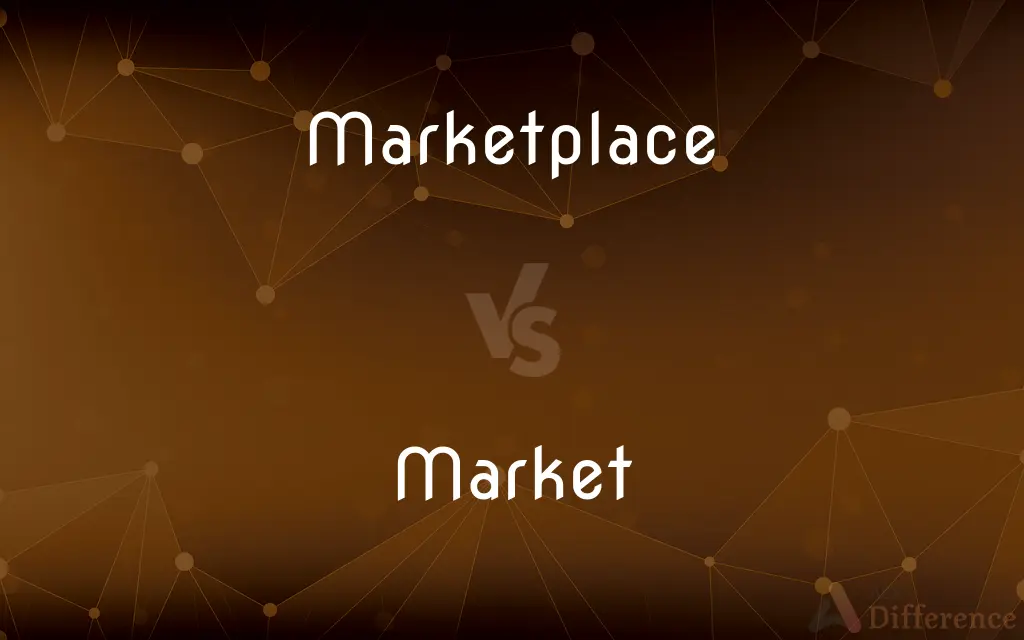Marketplace vs. Market — What's the Difference?
Edited by Tayyaba Rehman — By Maham Liaqat — Updated on February 22, 2024
A marketplace is a physical or digital space where buyers and sellers convene to exchange goods and services, while a market refers broadly to the economic environment or system where trading occurs.

Difference Between Marketplace and Market
Table of Contents
ADVERTISEMENT
Key Differences
A marketplace is characterized by its role as a specific location or platform for transactions. It can be a physical place, like a farmers' market or a flea market, or a digital platform, such as an e-commerce website or app. In contrast, a market encompasses a wider concept, including not just the place of exchange but also the demand and supply dynamics, the participants, and the regulatory environment. It's about the ecosystem in which marketplaces operate.
Marketplaces provide the infrastructure for transactions, while markets define the broader environment that influences these transactions. For example, the stock market operates through various marketplaces like the New York Stock Exchange (NYSE) or Nasdaq, where stocks are bought and sold.
The function of a marketplace is primarily to facilitate the meeting of buyers and sellers, making it easier for transactions to occur. Marketplaces can be specialized, focusing on specific types of goods or services, or general, offering a wide range of items. Markets, however, refer to the abstract concept of demand and supply for goods and services, not tied to a specific location or platform.
Marketplaces are tangible or virtual spaces that directly influence consumer behavior through their layout, accessibility, and the variety of goods and services they offer. They are designed to attract both buyers and sellers, creating an efficient trading environment. Markets, on the other hand, are shaped by broader economic forces and societal trends, which determine the overall context in which marketplaces operate.
The distinction also highlights the difference in scale and scope between the two concepts. A marketplace is a microcosm of the larger market environment, reflecting specific aspects of buyer-seller interactions within the broader economic landscape. Markets encompass the cumulative effect of all marketplaces and additional economic activities not confined to specific locations or platforms.
ADVERTISEMENT
Comparison Chart
Definition
A specific location or platform for transactions.
The economic system of demand and supply for goods and services.
Scope
Focused on the physical or digital space for trading.
Encompasses the overall trading environment, including marketplaces.
Function
Facilitates the direct exchange between buyers and sellers.
Defines the broader economic context influencing transactions.
Examples
Farmers' markets, e-commerce websites.
Stock market, real estate market.
Influence
Direct impact on consumer behavior through accessibility and variety.
Shaped by economic forces, consumer trends, and regulations.
Compare with Definitions
Marketplace
A designated space for buying and selling goods and services.
She sells handmade crafts in the local online marketplace.
Market
The overall demand for and supply of goods and services.
The housing market has been fluctuating significantly.
Marketplace
An e-commerce platform where multiple vendors can list products.
The new app has grown into a popular marketplace for vintage clothes.
Market
An abstract concept referring to the economic environment.
The tech market is highly competitive.
Marketplace
A website or app facilitating commercial exchanges between users.
He frequently buys rare books from an international marketplace.
Market
The collective group of buyers and sellers in an area.
The local market for organic produce is growing.
Marketplace
A venue for the exchange of specific types of goods.
The art marketplace has seen a surge in digital art sales.
Market
The economic activities related to the trading of a specific product.
The global coffee market is expanding.
Marketplace
A physical area where traders gather to sell their items.
The weekend marketplace is bustling with activity.
Market
The context within which business competition occurs.
New companies are entering the market at a rapid pace.
Marketplace
An open area or square in a town where a public market or sale is set up.
Market
The sum total traded in a process of individuals trading for certain commodities.
Marketplace
An area in a town where a public mercantile establishment is set up.
Marketplace
An open area in a town housing a public market.
Common Curiosities
How does a market influence a marketplace?
Market conditions, such as demand and supply dynamics, consumer preferences, and economic trends, directly impact the operations and success of marketplaces.
Can a market exist without marketplaces?
Conceptually, yes. A market refers to the abstract idea of demand and supply, which can exist without a designated physical or digital space.
How do markets evolve?
Markets evolve based on changes in consumer behavior, technological advancements, and shifts in economic policies and conditions.
Can a marketplace affect the market?
Yes, successful marketplaces can influence market trends, demand, and supply by providing innovative platforms for exchange and altering consumer behavior.
What is the significance of digital marketplaces in today’s economy?
Digital marketplaces have significantly expanded the reach of businesses, increased consumer choice, and streamlined the buying and selling process.
Is a supermarket a market or a marketplace?
A supermarket is a type of marketplace, as it is a specific location where goods are sold to consumers.
How do regulations impact markets and marketplaces?
Regulations can define the operational boundaries for marketplaces and influence market dynamics by setting standards and protecting consumers.
What is the difference between a marketplace and a market?
A marketplace is a specific location or platform for transactions, while a market refers to the broader economic environment of demand and supply.
Can a single company dominate a market or marketplace?
Yes, through significant market share or control over a marketplace, a company can dominate, but this may attract regulatory scrutiny.
Are online platforms considered marketplaces or markets?
Online platforms are considered marketplaces as they provide a digital space for buyers and sellers to conduct transactions.
How important is competition in a market?
Competition is crucial in a market as it drives innovation, improves quality, and helps regulate prices.
What roles do marketplaces play in the economy?
Marketplaces facilitate economic transactions, contribute to market efficiency, and can drive innovation and competition within markets.
What factors contribute to the growth of a market?
Economic growth, technological innovation, and shifts in consumer preferences are key factors that contribute to market expansion.
What is market segmentation?
Market segmentation is the process of dividing a market into distinct groups of buyers with different needs or characteristics.
What is a market analysis?
Market analysis is the evaluation of the market within a specific industry, including trends, competition, and customer preferences.
Share Your Discovery

Previous Comparison
Celebrity vs. Famous
Next Comparison
Ambiguity vs. VaguenessAuthor Spotlight
Written by
Maham LiaqatEdited by
Tayyaba RehmanTayyaba Rehman is a distinguished writer, currently serving as a primary contributor to askdifference.com. As a researcher in semantics and etymology, Tayyaba's passion for the complexity of languages and their distinctions has found a perfect home on the platform. Tayyaba delves into the intricacies of language, distinguishing between commonly confused words and phrases, thereby providing clarity for readers worldwide.
















































